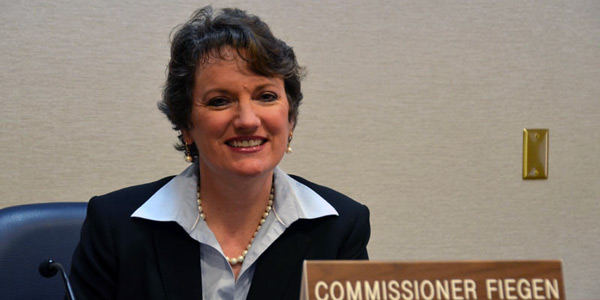SPP’s Regional State Committee last week approved doubling the timeframe for conducting regional cost allocation reviews (RCARs), leaving only approval from the Board of Directors this week before the change becomes official.
Staff had been conducting RCARs every three years. With board approval of the recommendation and accompanying revision request (TRR-223), those reviews will now be conducted every six years.
The Market and Operations Policy Committee earlier approved the same recommendation from the Regional Allocation Review Task Force, which said the change would save SPP manpower and consulting costs. (See “Cost Allocation Review Cycle Could Extend to 6 Years,” SPP Markets and Operations Policy Committee Briefs.)
The most recent review, RCAR II, showed more positive benefit-to-cost ratios and only one deficient transmission zone, which already has a project in the 2017 Integrated Transmission Planning assessment. SPP said it took about 2,100 staff hours and more than $417,000 in payments to outside consultants to complete the review. The first RCAR incurred a similar expense.
“It’s a really elegant solution, because it takes a tremendous amount of staff’s time,” said Donna Nelson, chair of the Public Utility Commission of Texas. “It’s a heavy lift. All of the commissioners here have been very respectful of each other, with respect to the cost-benefit analysis.”
South Dakota Public Utilities Commissioner Kristie Fiegen isn’t so sure. “I believe we could be locking in winners or losers for an extended period of time,” she said. “It concerns me we’re moving the cost allocation review out six years, but I certainly appreciate the group looking at the cost of the study. The cost-benefit ratio is extremely important to our stakeholders.”

Feigen | kristiefiegen.com
Patrick Lyons, chair of the New Mexico Public Regulation Commission, advocated for a four-year delay between reviews, but none of the other committee members backed his proposal.
Staff pointed out that any member that feels it has an imbalanced cost allocation can request relief through the MOPC. It also said it was trying to improve the review process through the use of more accurate information.
“One thing staff is doing now is using real market data and running the market [model] without that transmission, then going back to Day 1 of the market to find the value of the transmission,” SPP General Counsel Paul Suskie said. “We’re looking at possible different ways to do the RCAR.”
Wise: Few Solutions to Wind-Energy Glut

Golden Spread Electric Cooperative’s Mike Wise told the committee that his Export Pricing Task Force did not have a “whole lot of solutions” for shipping SPP’s ample wind resources out of the footprint.
“We’re waiting on members and staff to bring ideas,” said Wise, who chairs the group and the Strategic Planning Committee. “There’s no stomach inside the task force or the SPC, that I’ve heard, that we want to build transmission to export wind and have the consumers in the footprint pay for it. I would encourage anyone who wants to come get the wind to build the transmission.”
The group has prioritized several market changes — such as ramp products and storage resources — to accommodate wind exports as staff time and dollars are available over the next few years. Wise said the group would continue meeting over the next few months as “opportunities” are brought forward.
SPP has more than 16 GW of installed and operational wind capacity, another 8 GW with signed generation interconnection agreements and a potential 43 GW overall.
The task force has begun to explore coordinated transaction scheduling, which allows for near real-time scheduling of power across RTO interfaces, based on the price spread between RTOs. (PJM has adopted CTS with NYISO and plans to launch with MISO this fall.)
“We really have to work with the other RTOs,” Wise said. “It’s not MISO that needs the power, it’s the other RTOs east of MISO.”
Committee Approves CAWG Recommendations
The RSC also approved several motions from the Cost Allocation Working Group, which reports up to the committee. The items were also approved by the MOPC earlier this month.
- A recommendation to approve the Seams Projects Policy Paper as consistent with previous RSC actions. The paper sets guidelines for SPP approval and cost allocation processes for non-FERC Order 1000 interregional transmission projects on a project-by-project basis.
- Another recommendation to approve regional funding for SPP’s portion of a transformer project and line uprate at an Associated Electric Cooperative Inc. substation near Springfield, Mo.
- Approval of RTWG-RR208, which implements the Transmission Planning Improvement Task Force’s white paper for new regional planning processes by replacing current planning schedules with an annual transmission expansion plan, creating a standardized scope; establishing a common planning model for use across the various planning processes; and creating a staff/stakeholder accountability program.
- Finding MRR203 consistent with respect to the allocation of financial transmission rights. The revision adds a “last-chance” second set of auction revenue rights nominations in the monthly ARR process, where any source-to-sink path can be nominated.
- Finding RR202 also consistent with the RSC’s past policy decisions with in allocating FTRs. The change complies with FERC guidance on SPP’s disparate treatment of point-to-point and network integration transmission service (NITS) during re-dispatch. NITS would be eligible for ARR during limited times of the year and only for the service not subject to redispatch, but not for long-term congestion rights. (See SPP Hopes Congestion Rights Rule Change Wins FERC OK.)
– Tom Kleckner




